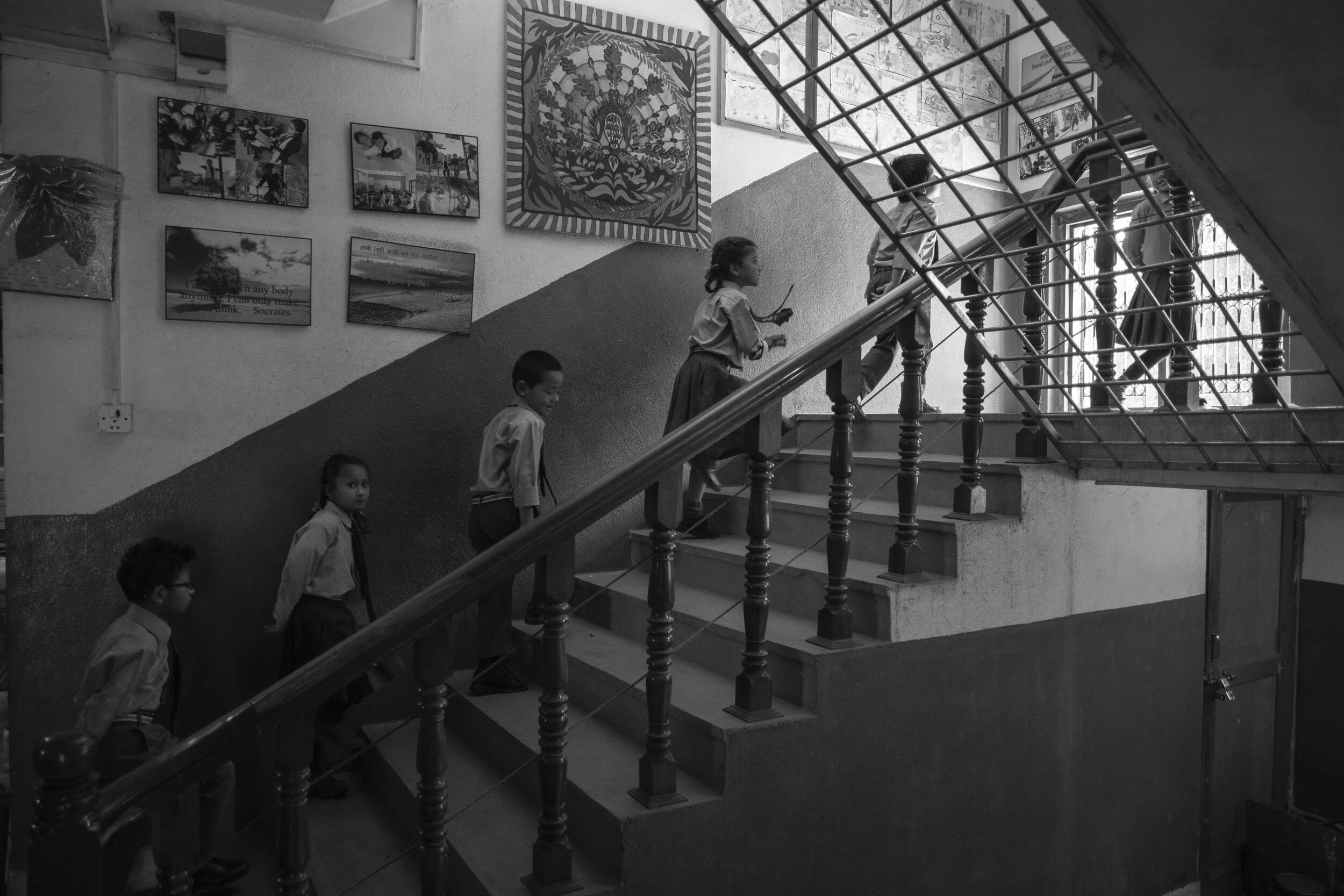Photo by Artur Gajda
Words and Photos by Artur Gajda
On a rainy school day, in Bhaktapur, Nepal, the power has gone out in classrooms. In the darkness, children enjoy a dim recess. Their smiles and wide eyes light up with the kind of energy you only see in children.
Teeming with curiosity and potential, they are here to learn through unique projects that have been meticulously developed and implemented by the Organization for Indigent Tots (TOIT).
TOIT strives to stand out as a school by operating on the tenet that education should lead to happiness and that without happiness and freedom to find self-actualization, students can never truly achieve freedom.
“Children are like flowers, each child will blossom at a different time. Some children are in fact not flowers but trees, and may take years to grow,” said TOIT founder Indra Prasad Khaitu.
Photo by Artur Gajda
A man of great contemplation and unexpectedly enlightening analogies, Khaitu’s appearance is that of a man half his age. He is constantly smiling and exuding an intensity in his eyes that speaks to the passion inside of his heart.
“I was never a good student,” he said, “and because of this, I suffered when I was growing up, both mentally and physically. My mental torture came in the form of the disappointment of my parents and my physical torture was unkindly provided by my teachers whenever I misbehaved or struggled academically. At 14 years old I realized that there must be a better way, and so the seeds of TOIT were sown.”
Bhaktapur is Khaitu’s birthplace and his home. The city lies on the sprawling outskirts of Kathmandu. It is known as the City of Worshippers, where the inescapable fragrance of incense permeates the air from the countless Hindu shrines scattered throughout this cultural center.
Every morning, worshippers make their rounds to offer flower petals, rice, and prayers to deities who will bring favours to them and their families.
There are an estimated 800 schools for children in the Bhaktapur district; a mix of public and private institutions spread over 4 municipalities with a population of approximately 305,000.
Photo by Artur Gajda
School programs are often operated as purely administrative and lucrative institutions. They are in competition with one another and sometimes forcefully recruit students from families that are opposed to sending their children to a particular school, or who cannot afford to pay the school fees.
This cycle often puts strains on families and unwanted pressures on students who have difficulties adapting to hostile environments and achieving the unreasonably high academic standards set forth.
Many drop out of classes, oftentimes in secrecy from their families, or suffer mental and physical abuses from overzealous teachers determined to upholding the reputation and prestige of their respective institutions; reputations which, in turn, earn them business.
“If there are one hundred schools in Bhaktapur, we do not intend simply to become one hundred and one,” said Khaitu. Caste connotations, which are common throughout Nepal, can often lead to devastating and negative effects on children. TOIT strives to accept mixed-age students, free of minority and caste labels in order to ensure inclusion and promote a healthy environment.
Photo by Artur Gajda
The variety of programming and teaching styles aim to cater to students’ individual strengths. The teachers hope to foster those aptitudes by allowing their students time to explore, develop self-expression, and learn in ways that feel most authentic to themselves.
Khaitu is striving to create opportunities that were never offered to him, forging his own path instead of accommodating to people’s demands. Even though marrying outside of caste can lead to serious repercussions in Nepali society, including disownment by the family, Khaitu did it. He now lives happily with his wife Scienchita and two daughters, Aahana and Aaniya.
This self-determination, both in his personal life choices and the ones aimed at creating a positive impact around him, has benefitted several children and their respective families.
Photo by Artur Gajda
Rupa is five years old and attends TOIT. She lives in a one-room tin shack that is shared with her parents and two sisters. Her father Jabaharlal Shah came from a rural area of India and married a Nepali woman, Sabita.
They settled in Bhaktapur in hopes of earning more money to support his family of six — his eldest daughter was a victim of the 2015 earthquake that struck Kathmandu.
Shah is only twenty-eight years old, but his face shows the characteristics of a hard-working man, having laboured since he was twelve years old. As he lovingly holds Rupa on his lap, he explains how happy he is to have his daughter attend a school such as TOIT.
He shared that Rupa’s behaviour has changed positively in the time she has spent at school.
Photo by Artur Gajda
“She is much happier and much more social. She has such an interest in reading and writing, and she is more disciplined, which is very good.”
Rupa’s teachers and classmates have noticed the changes too. After slowly adjusting to a new language and cultural differences, she has made many friends at school and loves to draw.
Though as more families become interested in TOIT, the financial demands of the school continue to grow.
“We rely on support from abroad to provide more opportunities to children as we grow,” said Khaitu. He and TOIT stand firm as the organization looks toward a clear path into the future of children’s education in Bhaktapur.
To learn more about the Organization for Indigent Tots and support their work, visit their website.

















